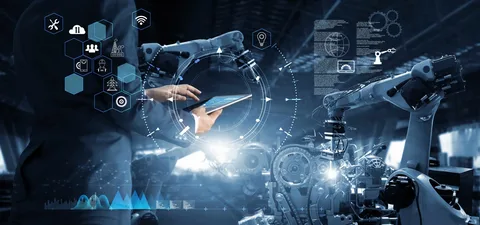We are living in a time unlike any before—a digital age where the pace of technological advancement is almost too fast to track. From artificial intelligence and quantum computing to biotechnology and augmented reality, the world is undergoing a massive transformation. This is not just a wave we’re riding—it’s a tide that is reshaping the entire coastline of human experience.
What once felt like science fiction—self-driving cars, smart homes, virtual doctors—is now real and evolving. Technology is no longer confined to labs or luxury; it’s embedded in our daily routines, our workspaces, our learning environments, and even the way we connect as human beings.
The Unstoppable Acceleration of Technology:
In previous decades, technological innovation moved steadily, giving society time to adapt. But now, it’s not just evolving—it’s exploding. Breakthroughs that once took years now emerge in months. Thanks to global connectivity, shared data, and powerful computing, progress has hit warp speed.
Artificial Intelligence (AI) can now write articles, compose music, diagnose diseases, and even mimic human conversation. Augmented Reality (AR) is changing how we shop, design, and learn. Quantum computing is inching closer to solving problems regular computers can’t touch. And automation? It’s redefining the workforce across every industry. This acceleration isn’t just about shiny gadgets. It’s about the fundamental way we live and interact with the world around us.
Our smartphones alone are more powerful than the computers that sent humans to the moon. We stream high-definition content, access information from across the globe, video call someone halfway around the world, and control our homes—all from a device that fits in our pocket. Technology has become intimate. It’s no longer separate from us. It’s with us, around us, and, increasingly, inside us.
Why Must Everyone Understand Technology?
-
It’s Not Optional Anymore
In the past, you could choose to engage with technology or not. Today, that choice is fading. Whether you’re a student, teacher, artist, farmer, or CEO, tech touches your life. From how we apply for jobs to how we receive medical care, technology plays a central role.
To remain relevant, informed, and empowered, understanding the basics of technology is no longer a luxury—it’s a necessity.
-
Empowering Through Literacy
Tech literacy doesn’t mean you need to code or build machines. It means understanding how things work, how data is used, what privacy means online, and how emerging tools can be both helpful and harmful.
A tech-literate individual can protect themselves in a digital world, make smarter decisions, and seize opportunities that others may miss. In contrast, a lack of understanding can leave someone vulnerable—to misinformation, digital scams, and professional stagnation.
The Expanding Impact of Technology in Every Field:
-
Healthcare
In hospitals and labs around the world, technology is saving lives. AI-driven diagnostics are detecting diseases faster than ever. Wearable devices monitor heart rates, sleep, and even blood oxygen levels in real-time. Remote surgery, once unthinkable, is now a growing field powered by robotics and 5G.
Telemedicine has made healthcare accessible to remote areas. Genetic editing tools like CRISPR offer hope for eradicating hereditary diseases. This is no longer the future—it’s happening right now.
-
Education
The classroom is no longer defined by four walls. Digital platforms and tools have democratized education. Anyone with an internet connection can now learn from world-class universities, access personalized learning paths, or collaborate with peers globally.
Virtual reality is being used to take students on virtual field trips across space and time. AI tutors adapt to student needs in real time. Tech is not replacing teachers—it’s empowering them.
-
Business and Economy
In the corporate world, technology is revolutionizing operations. Automation reduces repetitive tasks. Data analytics drives smarter decisions. Cloud computing allows teams to work from anywhere. E-commerce is thriving like never before, reaching markets once thought unreachable.
Entire industries are being born from technological innovation—cryptocurrency, the gig economy, fintech, and space tourism, to name a few. For businesses, adapting isn’t optional—it’s a survival strategy.
-
Agriculture and Environment
Technology is also transforming how we care for our planet and produce food. Smart agriculture uses sensors, drones, and data to optimize crop yields. Vertical farming brings fresh produce to cities. AI models predict climate patterns and guide disaster responses.
Environmental monitoring tech is helping us track pollution, protect wildlife, and design sustainable solutions. In short, tech is not just about convenience—it’s a critical tool for survival.
The Social and Ethical Side of Technology:
-
The Double-Edged Sword
With great power comes great responsibility. As much as tech enhances our lives, it also introduces new risks. Privacy concerns, data breaches, algorithmic bias, and misinformation are just a few of the darker aspects of our digital age.
As artificial intelligence grows more powerful, ethical questions arise. Who’s responsible for the decisions AI makes? How do we ensure fairness in a system run by machines? Who gets access to new technologies—and who gets left behind?
Understanding tech isn’t just about using it—it’s about questioning it, shaping it, and holding it accountable.
-
The Need for Digital Ethics
To navigate this new world wisely, we need a digital moral compass. Governments, companies, and individuals must come together to create fair, inclusive, and transparent systems. This is where understanding technology becomes not just a skill, but a civic duty.
When we know how tech works, we can vote wisely, support ethical businesses, and raise children who are not only tech-savvy but ethically grounded.
The Future:
The next decade promises advancements that could seem like magic. We’re talking about brain-computer interfaces, synthetic biology, intelligent robots, smart cities, and interplanetary communication. The line between human and machine is blurring. The gap between imagination and reality is narrowing.
But the true power of the future won’t lie in the tech itself. It will lie in how humans choose to use it.
No matter how intelligent our machines become, the values that guide them must come from us. Compassion, curiosity, responsibility, and respect—these are human traits that no code can replicate. Technology must serve humanity, not the other way around.
That’s why understanding, engaging with, and even questioning technology is essential. The future isn’t being written in some faraway lab. It’s being written by all of us, every day.
Conclusion:
Technology is no longer a background actor—it’s center stage. It’s directing how we learn, heal, work, and live. Ignoring it is like ignoring the air around you. You might not see it, but it’s shaping everything.
To thrive in this era, we don’t need to fear technology—we need to understand it. We need to stay curious, ask questions, and be active participants in the world we’re building. Because in the end, the story of technology is the story of us. And it’s only just beginning.




